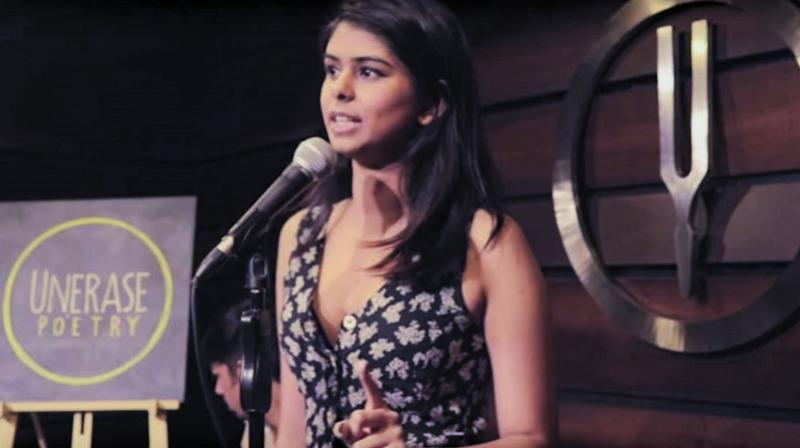
Aranya Johar was born in Mumbai, India on the 7th of September 1998. She began writing poetry based on her experiences of misogyny and did her first poetry performance at an open mic session when she was 12 years old. Whilst in school, Johar was diagnosed with Attention Deficit Disorder (ADD) and she uses poetry to raise awareness about the condition and mental health.
Aranya co-founded More Than Mics with friend Prachee Mashru, to develop creative platforms for people involved in performance arts. She is also the curator of the ‘Blind Poetry Sessions’, a series of poetry nights which take place in a dark room meaning the poets are anonymous and the co-curator of ‘Throwback Thursday’, an event where poets read out their first work as well as their most recent. Through her own brilliant slam poetry and spoken word, Johar addresses important issues such as mental health, gender inequality and body positivity.
On the weekend that it was uploaded online, her video ‘To Bleed Without Violence’ reached 7 million views and she went on to recite this poem at the Harvard Model United Nations event. The young poet has since been featured in Rolling Stone, Harper Bazaar and Teen Vogue and in December 2017, she performed at the We The Women event in association with UN Women.
For International Women’s Day 2019, she collaborated with UnErase Poetry, a spoken word collective on the campaign #PatriarchyKaPackup. The campaign aimed to smash patriarchy and get young Indian women to use spoken word to tackle the traditional gender norms holding girls back from accessing education in India. Alongside her activism and poetry, Johar is also the youngest member of the G7’s gender equality advisory council and was featured in the celebrated BBC’s 100 Women of 2019.
Through her writing, including pieces titled “A Brown Girl’s Guide to Gender”, “To India: With Love” and “Women Will”, Johar addresses issues such as mental health, gender inequality and body positivity. Using this exciting type of poetry as a form of communication opens up the sphere to young people that may not have been as appealing before, proving that it is a powerful tool to get our voices heard. Having the courage to stand up in front of strangers and be vulnerable about her personal life will encourage other young women who may struggle to voice their thoughts and confidently challenge gender inequality.
-Emily Clarke, Junior Girl
